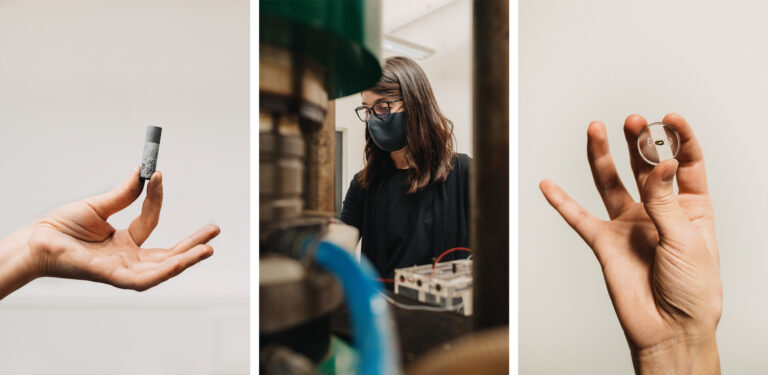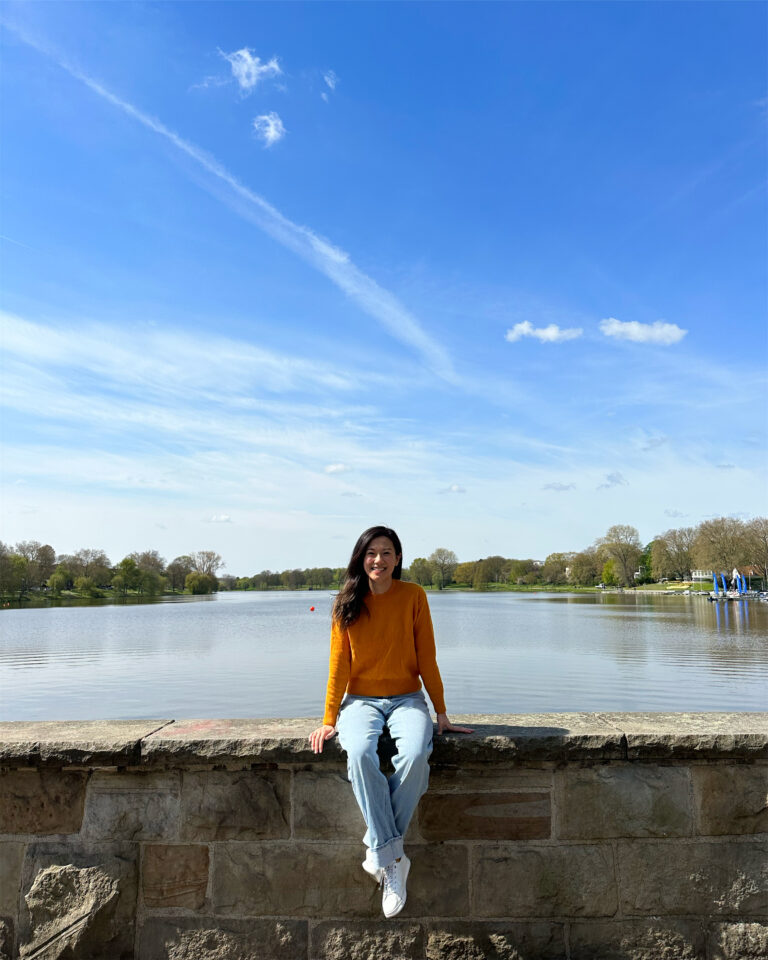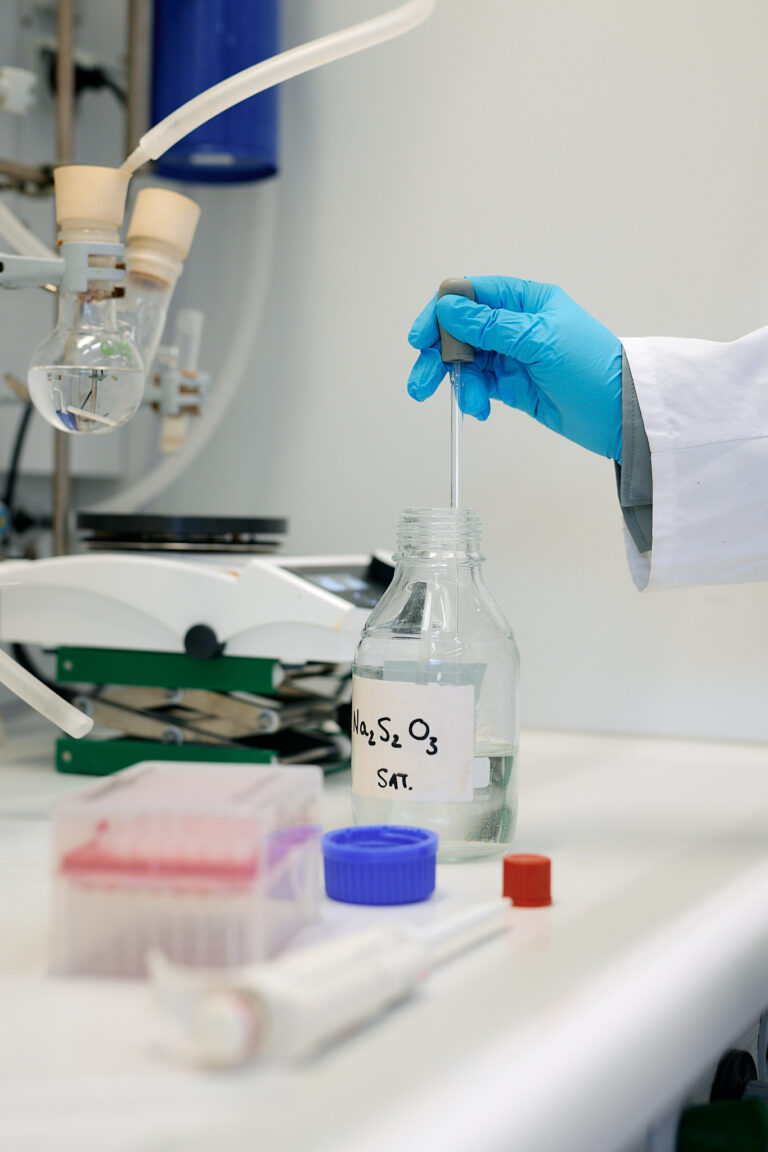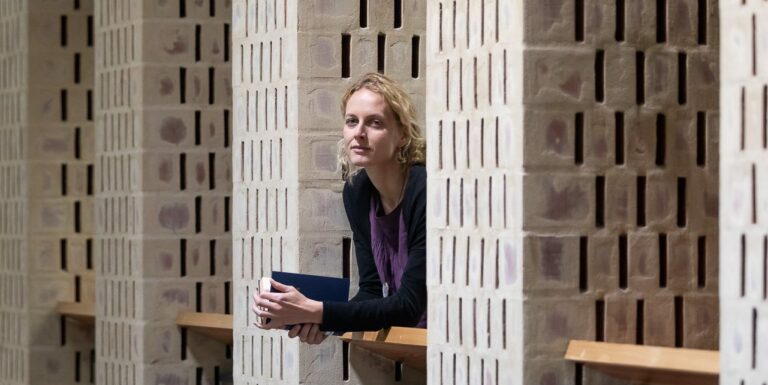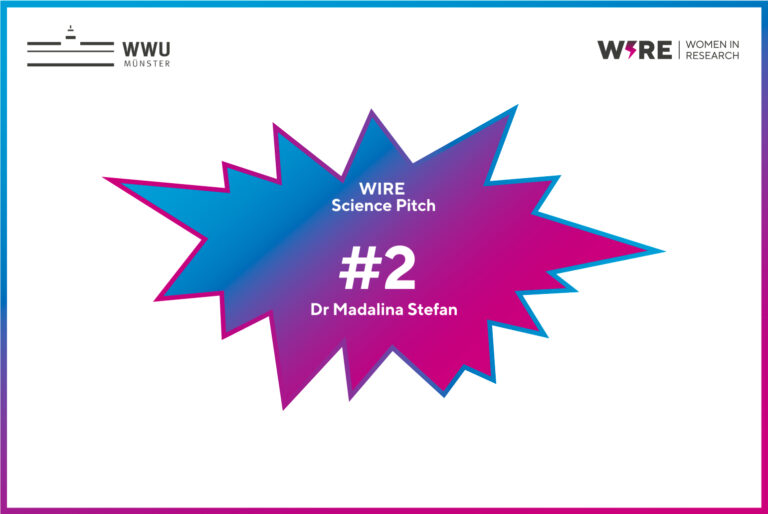
An Interview with Archaeologist Francesca Mazzilli – Piecing Together The Past by Putting Sacred Places into Context
In the series “33 questions” we introduce, in no particular order, our WiRe Fellows who are currently working on a research project here at the University of Münster. Why 33? Well, if we think of the rush hour of life, it is kind of the age that lies in the middle. And we also like the number😉.
In today’s episode we are speaking with Dr. Francesca Mazzilli, passionate lover of archaeology.

1. What motivated you to work in the field of archaeology?
Indiana Jones movies, right? I am joking. I was always fascinated by ancient cultures and curious about different cultures. I always liked the physical and exciting side of digging and discovering new finds and, at the same time, reading books about ancient history. I have this memory when I was a child: I often asked my mum if I could photocopy my older sisters’ books to research a topic related to history.
2. Describe your daily work in three words.
Challenging, Innovative, Analytical.
3. Describe your research topic in three words.
Sacred Places into Context.
4. A good archaeologist needs…?
Their own trowel to take with them on an excavation.
5. What is the best experience you have had as a scientist / researcher?
It is when you have a new idea, you are puzzled why no one has been thinking about this before and you are lucky enough to manage to see this idea taking shape and developing it in different stages. No matter what project you are doing you still have the same level of excitement every time.
If we talk about a specific moment, it is one when I was awarded the Marie Skłodowska-Curie Fellowship. I could not believe it; it is a lifetime achievement for me, it was my first major grant that I received so I was all over the moon. Needless to say, we celebrated with champagne.
As an archaeologist, it is this thrilling anticipation while you excavate and you start finding something interesting and shiny in the ground, like red-slipped pottery, and you do not know if it will be only a fragment or the entire vessel.

6. What does a typical (work) day look like for you?
It has to start with an Italian cappuccino, often made at home. My work routine begins with turning on my laptop and checking my emails, Twitter, and to-do list. Depending on the tasks assigned for that day, I will read a set of articles, write or edit an article, create a map or do data entry for my project while planning what to do in the following days. I dedicate some time during the day to replying to colleagues’ emails, but I do not always have the time to respond to all of them. During the week, I would have one or more online meetings with my international colleagues, a precious time for the growth of ongoing and new collaborations.
7. What keeps you motivated in your work day in and day out?
Curiosity and the eagerness to learn about everything, especially about cultures and people in the past. I always say once I stop learning, I can resign, but life is a learning curve…
More recently, transmitting and communicating my knowledge to people and supporting them has been very rewarding. Teaching and outreach activities enable me to do that; they are equally important parts of my work and projects.
8. What was your biggest research disaster? What did you learn out of it?
When your publication is out, you have this feeling that you should have spent more time on it. There is always an article on the topic that came out too late to be included in your publication. Then, you make peace with it and realise it is the nature of research as it constantly evolves. Your contribution is only a tiny tessera in an enormous mosaic. You can always write a new article about it.
9. What is your favourite research discipline other than your own?
Art. It is an expression of different epochs and the sensibility of individuals, while each viewer can have a different reaction to it.
10. What do you consider the greatest achievement in the history of science / research / your field?
One of the most recent remarkable achievements is the one by the Nobel Prize winner Svante Pääbo, a geneticist who succeeded in sequencing the genome of the Neanderthal, which also helps understand the human immune system.
One of the most significant discoveries for the Classical world is Pompei. Ironically, even as a major natural disaster, the volcanic eruption has enabled us to gain unique information about daily life in a Roman city due to its preservation.


11. What was the funniest moment you had in science?
There are many funny moments when you are on an archaeological excavation. When you spend a lot of time excavating skeletons and material culture, you start giving names and creating little stories around them. It is a time when you can be more creative, and you do not have to be accurate as it is totally fictional.
12. How did you survive your PhD time, and what advice and tips do you have for future PhD students?
Having a strong social network of friends and family helped me to go through my PhD time, they always encouraged and, sometimes, forced me to have breaks. Baking helped me a lot and it was nice to share the sweet results of my therapeutic culinary projects with colleagues and friends.
There is a light at the end of the tunnel, even if it feels endless and unachievable. Sometimes you have to let your PhD project go and submit the thesis. Networking and publishing are critical parts of the PhD program. If you want to carry on academia, you should have a clear plan for extending your PhD project to apply for funding.
13. What direct or indirect relevance does your research have for society?
When we walk on a road or in the countryside, we pay little attention to the different buildings or natural features. This is true, especially nowadays, that we are always in a rush and have GoogleMap to tell us how to reach our destination. However, while walking, we indirectly remember a big church or mountain we just passed by, especially if we get lost. My project aims to call attention to the following:
- How we unconsciously move in space, like we remember specific elements of the landscape that surround us and forget others, especially when repeatedly walking the same route.
- How towns/cities, civic buildings, religious buildings, roads, and natural features, like hilltops or streams, are interconnected, shaping where we live and move in.
- How the place we live in has social, religious, economic, and political depths, influencing how the landscape is structured.
This study can help people to reconnect with their surroundings and empower them as they are integral part of where they live and move in, and they also directly and indirectly shape it. This study can be achieved by examining a case study from the past, Garvão from the third-second century BC in south of Portugal.
It is important to study the past as it can help us look at the present and vice versa how the present can help read the patchy evidence left to us from the past. This study can help people to reconsider the significance of learning about the past to understand and deal with the present-world.
14. How did you imagine the life of a scientist / researcher when you were a high school student? Is it actually different? In what way?
I imagined a scientist to be someone in the lab coat and googles or a bookworm.
I feel it is pretty accurate depending on the fields of your research. I did not pursue the lab side of archaeology, as a result I do spend a lot of time in libraries. Although the time to climb the ladders to reach the books on top shelves in the library has been dramatically reduced as a lot of publications are accessible online, I have already climbed the ladders in university libraries in Münster various times within a month of my staying. It is part of the fun!
15. What do you like most about the “lifestyle” of a scientist / researcher? And what least of it?
It has a lot of benefits: travelling, meeting interesting people, managing your own time, independence in your work as well as collaborating with other researchers, and ultimately working on something you are passionate about.
At the same time, you often have to put aside your personal life because it is difficult to find these job opportunities next to your doorstep. Generally, this type of work takes you away from your partner, family, and friends. Another major issue is the difficulty of long-term planning because you have short-term temporary positions, and you never know what will be next, and if you can pay rent (forget about a mortgage).
16. Do you think your career would have evolved differently if you were a man?
I think I would have been more confident, and I would not worry about the biological clock.
17. Where do you see yourself in 10 years?
I have stopped having three, five or ten-years plan, as my life has taken me in various directions and places that I would have never thought about 10 years ago, although I consider myself lucky that my last 10 years has been a positive, enjoyable and definitely not-boring roller-coaster. In 10 years-time I would probably still learn about and discover (ancient) cultures, still do research, and still share my knowledge and passion about archaeology and cultural diversities with people.

18. If you were the research minister of Germany, what would you do to improve the situation of women in science?
I think it is great that there are different programs specifically addressed to women in Germany, like WiRe and in academic job advertisements preference to women is explicitly encouraged.
Yet, there are usually more men in higher-up permanent positions, this is most likely because they have more freedom than women in our society.
This gender imbalance should be addressed from the bottom of the chain as it is embedded in our society.
The research minister and all of us really need to educate people from when they are children in order to break through this pattern from the root of the problem.
19. If you had a daughter, what would you advise her not to do?
Do not limit yourself because society has labelled you differently from men. Be confident and bold. Do not follow conventions.
20. How would you explain your research area and topic to a child?
When you build a public place for people to get together, like a cinema, you have to think if people can see from a distance and distinguish it from other shops, if people can get there quickly, if the place has got all the facilities that it needs to make it work nearby, like electricity. Maybe a businessman or the council of your city will invest money to build a big cinema. Whoever finances it will make sure that everyone will know about it. The more visible and accessible the cinema is, the more likely people will know about it. It is also important by word of mouth; you will go to that cinema if your friend tells you about it. If you pass by the cinema every day to go to school, you will want to go and check it out. If you pass by every day to go to school, you will also remember where it is. You will be able to say it is near a bakery, for example, just because you have passed by so many times.
In the past, it was more or less the same for religious places like churches or temples, because worshipping was very important and temples were also a place for people to meet.
For my project that looks at religious places in the south of Portugal, I will look at all the elements discussed for building a popular cinema because they help develop public places and are all important. For my project, I will check if one of the elements is more important than another. First of all, I will need to consider the location of temples, what they look like, their visibility, accessibility, and their importance in town and in the region. Religious places were important places to profess religion but also important places for people to meet. It involved rich people and the local community in supporting the temples financially. They left evidence of their benefaction, like something written on the wall of the temple, an altar or a statue. Temples were important for people who lived nearby but also those who came from further away because maybe some of their friends talked about how great this religious place was and invited them to go with them, and they liked it. If temples were in a visible place and on a road where people were passing by, people would have used the temple as a point of reference to tell the route for a destination.
This project will make you think differently about what buildings you see next time you go to school. It makes you think that understanding what ancient people did in the past is relatively easy and can be pretty fun. It can make you think about how you look at the place where you live and walk every day. People from the past were not that different from us.
21. What is the biggest challenge for you when it comes to balancing family and career? How do you master this / these challenge(s)?
It is the excitement and the commitment to be in a new place to do your research, while at the same time you would like to live with your partner, who cannot be there with you.
My approach for mastering these challenges? Taking flights and enjoying also the boring part of the travel and moves. I like flying and airports. I cannot force myself to like dealing with bureaucracy in different countries, yet, although this topic has become a great deal of amusement for my friends during dinner parties.
22. How often do you as a friend / partner / mother / daughter feel guilty when you have to meet a deadline – again?
I am quite lucky as my partner and family are very understanding. If we are in the same country, my partner will cook while I work and vice versa if he has a deadline. We make sure we have some extra quality time after the deadline.
23. How did you imagine your future as a child? What profession did you want to pursue?
I imagined being an archaeologist and doing a PhD! I have achieved my goals as a child, so everything else is a bonus, including this fellowship.


24. How do you keep your head clear when you are stressed?
I have a break which usually involves one of the followings: going for a walk, especially near a river or immersing in the green, doing yoga, going to the swimming pool, baking and listening to inspiring Youtube videos of Ven. Robina Courtin. Please, check her Youtube videos!
25. What makes you most happy about the world?
It is connecting with people and interaction with different cultures. It is nice that people are still eager to connect, even if the channels are different nowadays. Nevertheless, the pandemic has shown us that people still want to meet in person and still need physical contact. It is nice to shake hands and hug people, again.
26. What is your favorite German word?
More than a word, rather a gesture – the academic knocking at the end of a presentation is a pretty peculiar German custom.
And the word for goodbye – Tschüss! – sounds like someone is sneezing.
27. What or who inspired you to become an archaeologist?
My history teacher at elementary school. She made me fall in love with ancient history, especially Egypt. However, after day one of my bachelor at the university I realised Egyptology was not for me.
28. Which of your traits bothers you the most in your daily work? And which of your traits help you the most in your daily work?
I should not take rejections and negative feedback on a personal level. I am aware that academia is a highly competitive world. Eventually, I do see all the feedback as something positive and constructive. If the input is not constructive, the reviewer did not do their job correctly. Moreover, for me it is difficult to say no, so I overcommit myself when I should have more time for myself. I usually work overtime.
I think the traits that help me the most in my daily work and in my work in general are perseverance, curiosity, passion, being self-motivated, self-driven, hard-working and trying to break-down my daily tasks so I do not feel overwhelmed by the workload.
29. What worries you most about the world?
Nationalistic movements point fingers at foreigners when the country’s real problems should be sought in the country, their government, people’s mentality, and the market economy. Closing borders and closing your mind will not help you or the world. Differences and diversity can only enrich people and the world; the past has taught us this. It is also quite concerning that people are forgetting the past, even about tragic events that happened in the last 100 years, maybe because of a lack of education about learning history.

30. If you could travel in time: in which epoch and at which discovery or event would you have liked to have been there?
Although I am Roman or Classical archaeologist, I would have liked to have lived in prehistory (especially Stone Age) to see how people lived, moved, and interacted. Can you imagine how cool it would have been to be there when fire and wheel were invented? What would have been people’s reactions? Would have been some people reluctant about these new discoveries?
31. What is the biggest difference between the academic system you have last done research in and the academic system as you experience it in Münster / Germany?
It seems there is more flexibility in Münster than in Bergen or UK. For example, a couple of months before my fellowship, my mentor in Münster asked me if I wanted to teach a module about anything and there was no a specific format to follow.
I could not teach in Bergen during my postdoctoral fellowship, even if I had the support from my mentor. The teaching system is extremely structured in UK and it is difficult to change it or implement modules, especially if it is one year. I think it is a great opportunity for students to have an international scholar to teach a module as they are exposed to foreigner researchers. At the same time, it is beneficial for the scholar who can add this experience to their CV and feel more integrated in the Department.
32. What surprised you most about the University of Münster?
I find refreshing being part of the Religious Landscapes and Environmental Devotion Cloud from Der Exzellenzcluster ”Religion und Politik. Dynamiken von Tradition und Innovation“.
Although the discussion topics and articles in this cloud can be pretty broad, they can make you think about the religious landscape from a different perspective or put your research and your field in a different light. Talking with people and reading are precious tools we have to learn and enrich our work and mind.
33. If you could change one thing about the academic system in which you have last done research in, what would it be?
Getting a job in academia is a race against time because of the tied timeline of career progression. After your PhD, you have a small window of time to apply for the larger chunks of funding available for researchers. As the years pass by, there are fewer funding opportunities. This is because it is expected to have a permanent position after one or two postdocs, but this is not a realistic goal in the current job market. The only career break that can count from your PhD and any other academic positions is having a baby. Still, sometimes you are forced to have a break from academia, or it is just good to have a break. Still, it is not possible, as you need to justify any gaps in your curriculum. This will affect your eligibility to apply for funding or get a job in academia, despite your publication or the quality of your research project. This is the result of academia being highly competitive. How and can we overcome this? Research should not be a race against time. None prepares or warns you about this when you are doing a PhD.


